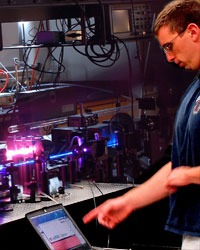
![]() MS in Physics Degree Requirements
MS in Physics Degree Requirements
![]() PhD in Physics Degree Requirements
PhD in Physics Degree Requirements
UMBC’s Physics MS and PhD programs are structured to provide concentrations in materials and solid-state physics, optics and astrophysics with research opportunities in each area. The research in the materials and solid-state physics concentration includes the classical and quantum properties of condensed matter, with emphases on solid-state, surface physics and polymer physics. The research in the optics concentration includes the interaction of electromagnetic radiation with matter, with emphases on optical and infrared spectroscopy, nonlinear optics, quantum optics, quantum computing, light scattering, atmospheric optics and atmospheric physics. The research in astrophysics focuses on the analysis of high-energy observations and examination of galaxy formation.
The general research areas have sufficient overlap that students can benefit from courses offered in other areas. Both optics and materials areas have relevance to research programs in other UMBC departments including physical chemistry, electrical engineering and mechanical engineering. The astrophysics program has a strong link to the facilities at NASA’s Goddard Space Flight Center (GSFC) Physics graduate students have the opportunity to interact with graduate students and faculty in several other departments at UMBC and local government laboratories.
Program Admission Requirements
The admission process is competitive, with selections determined by an Admissions Committee comprised of faculty members of the Department of Physics. The number of available admission slots varies from year to year based on faculty and financial resources. Applicants are required to submit undergraduate transcripts, 3 letters of recommendation, a personal statement of purpose, a statement on commitment to inclusive excellence. The UMBC Department of Physics is not collecting GRE test scores for applications for admission in Fall 2024. If you report these scores, or any other information that is not requested as part of the application, we will not take them into account in your application evaluation.
Financial Aid
All full-time PhD students are supported by 12-month Teaching Assistantships, Research Assistantships, or Research Fellowships. These include a stipend, tuition coverage, and health benefits.
Master of Science (MS)
Students may choose between a thesis option MS degree or non-thesis option MS degree. A minimum of 30 credits is required for either option. At least 18 of these 30 credits must be taken at the 600-level or higher.
All students must complete the core curriculum of PHYS 605 (3 credits) and either PHYS 601 (3 credits) or PHYS 424 (3 credits) taken for graduate credit. These two core courses must be passed with a grade of “B-” or higher. Students must also take two semesters of PHYS 698 (1 credit each).
Students selecting the thesis option MS must complete a further 16 credits of lecture coursework approved by the Graduate Program Director, and a minimum of 6 credits of PHYS 799. In addition, students must write and defend a thesis before a Master’s Thesis Examination Committee formed in accordance with Graduate School policies.
Students selecting the non-thesis option MS must complete a further 22 credits of lecture coursework approved by the Graduate Program Director, write a scholarly paper, and pass the written Qualifying Exam at the MS level. The Qualifying Exam must be passed within the first two years of the program.
Doctor of Philosophy (PhD)
Course Requirements
The PhD degree requires a minimum of 52 credits consisting of 7 core courses: PHYS 601, PHYS 602, PHYS 605, PHYS 606, PHYS 607, PHYS 701, PHYS 707 (3 credits each), three graduate elective courses (3 credits each), PHYS 690 (1 credit), three semesters of PHYS 698 (1 credit each), and a minimum of two semesters of PHYS 899 (9 credits each). Each of the 7 core courses must be passed with a grade of “B-” or higher.
Qualifying Exam
The written Qualifying Exam consists of 4 sections: Classical Mechanics, Thermodynamics and Statistical Mechanics, Quantum Mechanics, and Electricity and Magnetism. Each section is graded separately; if a student fails one or more sections, then he/she is only required to repeat those sections. The Qualifying Exam is offered in January and August each year. Students must pass all 4 sections of the Qualifying Exam by the beginning of their 4th semester in the program.
Preliminary PhD Committee and PhD Proposal
Students must secure a tenure-track member of the Department of Physics faculty to serve as their PhD research Advisor. In consultation with their PhD Advisor, students form a Preliminary PhD Committee consisting of the PhD Advisor and at least two other faculty members of the Department of Physics. At least two of the members of this committee must be tenure-track faculty. The Preliminary PhD Committee must be formed by the end of the 5th semester in the program.
Students must present a PhD research Proposal to their Preliminary PhD Committee. The PhD Proposal consists of two parts: a written proposal, and an oral presentation of the proposal.
PhD Candidacy and PhD Dissertation
After completing all required coursework (except PHYS 899), the Qualifying Examination, and the PhD Proposal, a student is eligible to be considered for PhD Candidacy. Based on the recommendation of the Preliminary PhD Committee, the full faculty of the Department of Physics will vote on the student’s admission to PhD Candidacy. All students must be voted into PhD Candidacy by the start of their 4th year in the program.
After admission to PhD Candidacy and completion of the doctoral research, students are required to write and defend a PhD Dissertation before a Final PhD Committee formed in accordance with Graduate School policies. The Chair of this committee must be a tenure-track member of the Department of Physics.